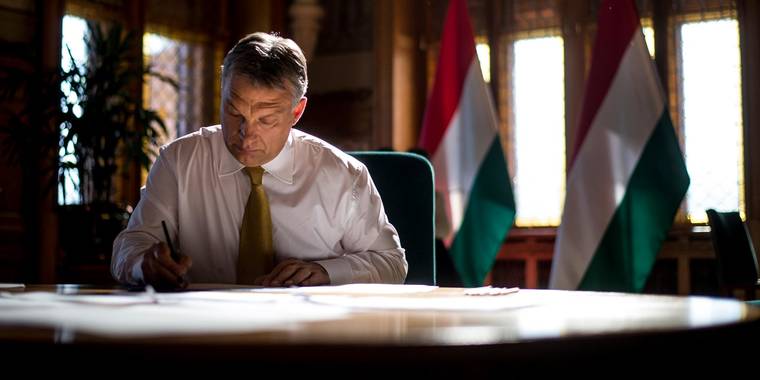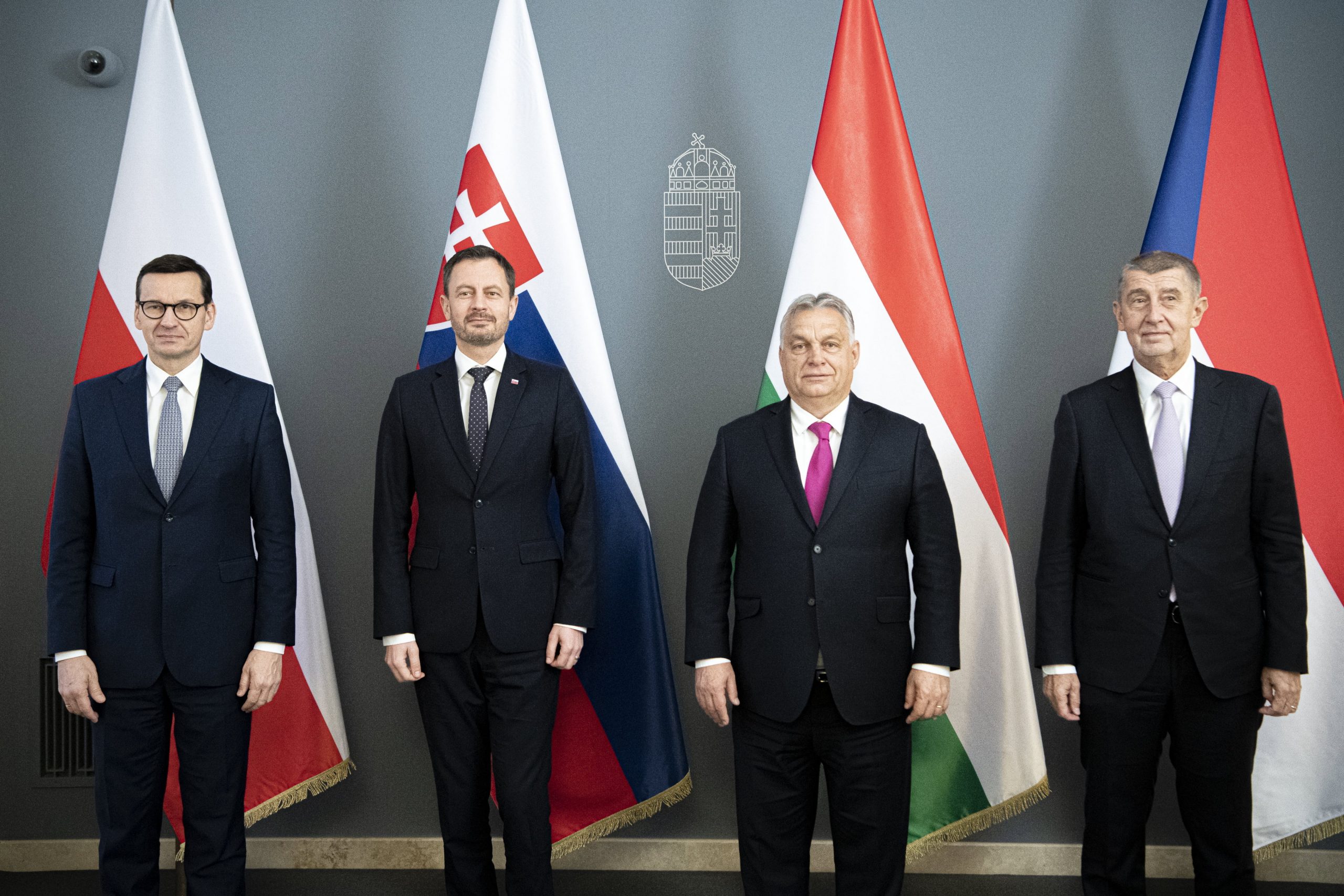
In the article published under the title ‘The V4 fulfil their mission,’ the Prime Minister underlined that during its history, Central Europe has always had a mission, not only a role, but “this fact was concealed from us by the region’s Soviet occupation until 1990”.
“Our prospects were diminished by and our energies were also tied up in the effort to rid ourselves of our communists, and to send them where they belong after the disappearance of the occupying bayonets. As far away from the power of government as possible, to the school textbook of historical sins for the education of our children and grandchildren, to show them what it leads to if anyone tries to build the future without heeding national ideals and Christian teachings,” the Prime Minister wrote.
He highlighted that “after the defeat of communism and the liberation of our countries,” “our hearts dictated that our countries, Poland, Hungary and Czechoslovakia must combine forces, no matter what.” We knew that centuries would come and go, but the shared fate of the peoples of Central Europe would remain, Mr Orbán added.
“And indeed, thirty years on, as members of NATO, we can look upon ourselves as the European Union’s most dynamic region. Solid growth, low unemployment, swift digital transformation, robust investments. This is what we are today,” he stated.
The Prime Minister pointed out that the difficult debates within the EU about migration, demography, the role of families, and the conflict of national culture versus multiculturalism repeatedly draw our attention to Central Europe’s historical mission.
He stressed that “according to the Hungarian way of thinking, Central Europe is the territory that lies between the lands of the Germans and the Russians,” while beyond doubt the V4 countries constitute the core territory of Central Europe.
“We Hungarians have always believed that we weren’t simply just born into this world. If you were born Hungarian, you also have a mission. Your mission points beyond yourself; its horizon and significance is European,” Mr Orbán wrote.
The Prime Minister argued that “in the territory that lies between the worlds of the Germans and the Russians – which is a territory of Latin Christianity bordering on Orthodoxy where many languages and national cultures developed – there is a specific common cultural quality, an outlook on life, a turn of mind, and a characteristic posture.”
“Polish, Slovak, Czech and Hungarian collections of poems, novels and films in the hundreds testify to this,” he stated.
Mr Orbán underlined that “our Europe” was created by the people who, at different points in time and independently of one another, attacked the Roman Empire.
These people adopted Latin Christianity, but did not surrender their own cultures, “and as a result, the hammer of history forged a variety of alloys,” he explained, adding that “with this, our fate was decided; not only national states, but also national cultures were born.”
He highlighted that “an ideal, a law, a kind of predestination was conceived about what Europe should be like. A great spiritual unity with common cultural guidelines, ideas and ultimate objectives. But with separate, independent members which are linked to one another in Europe’s unity.”
Europe is a diverse unity, and “those who attack its unity are bad Europeans, but so are those who want to wipe away its diversity,” the Prime Minister warned.
In his writing, Mr Orbán pointed out that the people of Central Europe understand that harmony lies in the tension and consonance of differences, and harmony does not mean uniformity; it does not mean a monotone, inarticulate collection of sounds. “This is where the mission of the Hungarians and the other Central European nations striving for independence stems from,” he added.
He stressed that the secret and condition of European balance and stability for centuries lay in the defence of the spirit that comprised nations and Christian European culture against all attacks coming from outside Europe as a bastion and a shield outward, and the defence of diversity against attempts at hegemony, attempts to prevail over independent nations as defence inward.
“This is European self-defence, and the French President, too, appears to be putting out feelers in this direction when he wants to introduce the idea of European sovereignty in Brussels,” the Prime Minister stated.
The Prime Minister said after the accession of the V4 countries to the European Union, “initially, the old club members perceived the ideas, strange to their ears, about country, Christianity, family and sovereignty more as cultural and historical folklore.”
“I think they believed that this was some kind of transitional phenomenon which stems from these countries coming late to the party, and would pass as chicken pox does,” he wrote.
He highlighted at the same time that the migrant crisis hit Europe hard, “eyes were opened up, the shades became brighter, and light was cast upon the profound differences between ways of thinking, philosophies, principles of social organisation, and personal commitments”.
“It was then that we Hungarians understood that the speeches and writings about a post-Christian and post-national era were not mere pieces of fancy journalism, but actual political intentions; in fact, a complete European programme, the future as envisaged by people in the West, a future, the building of which had already started,” Mr Orbán explained.
“We understood that while we, during communism in Europe’s Sovietised territory, longed for a way of life that is based on Christianity and sovereignty, those living in Europe’s Americanised half redefined the essence of Europe, and consistently worked on the implementation of their programme,” he added.
Mr Orbán underlined that “their new European mission is complete openness, the elimination of borders – and if borders do exist, only as a temporary and necessary evil –, gender roles and family models that can be changed at will, and a policy that perceives the duty to maintain our cultural heritage more as a task to be left to museologists.”
“And the goal is not only to conceive, to create, to introduce and to turn all this into legal obligations in their own countries, but to also make this general in every country of the European Union, including for those of our kind who show reluctance,” Mr Orbán wrote.
The Prime Minister pointed out that “in this European situation, to us Hungarians it is clear what our European mission lies in”.
“To take into the common store of European values the non-compromising anti-communist tradition; to place the sins and lessons of international socialism next to the sins and lessons of national socialism. To show the beauty and competitiveness of a political and social order that rests on Christian social teachings. To make primarily our French friends understand that in Central Europe there is a Christian model for the organisation of society which is based on the Teachings, regardless of the weakening, the stumbling of personal faith. To draw and maintain the attention of the nations that live in the safe interior territories of Europe to external threats. To remind them that the waves of people in the Mediterranean – that we know so well from history – are pushing the tide towards us, and these waves could well reach as far as Scandinavia,” Mr Orbán listed.
The Prime Minister added that “the masses of migrants now appearing on our doorstep are, in fact, the very same migrants longing for the European way of life that our ancestors always wanted to defend themselves against with all their might.”
“Non-defence is, in fact, surrender, and its consequence will be a complete civilisational transformation, as the nations living on the Southern and Eastern edges of Europe, in the vicinity of the Balkans could experience for themselves close up,” he wrote.
Mr Orbán also drew attention to the fact that we must “remind ourselves that no matter how enlightened the builders of this empire are, they spoil the spirit of Europe, and so we will always come to a contrary result.”
At the end of his writing, the Prime Minister also highlighted that “on these difficult and complex issues, there may well be differences between us, Visegrád Countries as well.”
“Surely, there are differences in emphases as regards our approaches to history, there may be differences in the way we feel for one country or another, and at times, we could even disagree on the way we see geopolitical events,” he argued, adding that “it is certain, however, that our nations fully appreciate the responsibility they bear for the future of Europe: To defend it against external attacks and to equally defend it from internal imperial designs; to maintain the sovereignty of our countries and nations.”
“Failing in the fulfilment of a mission is heroic, but hardly joyful. Fulfilling a mission, whilst guiding your country to success, freedom and welfare, is not any less heroic, but it is also joyful,” Mr Orbán wrote, underlining that he believes Central Europe has a good chance for the latter.
“On behalf of my nation, I’d like to say thank you for the three decades of Visegrád cooperation,” the Hungarian Prime Minister wrote in conclusion.

